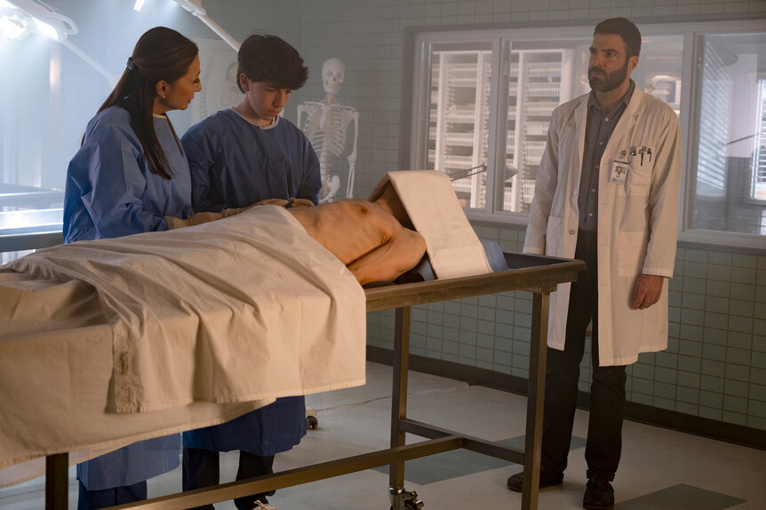Zachary Quinto on Singing in the Key of Family Dysfunction in Cult of Love
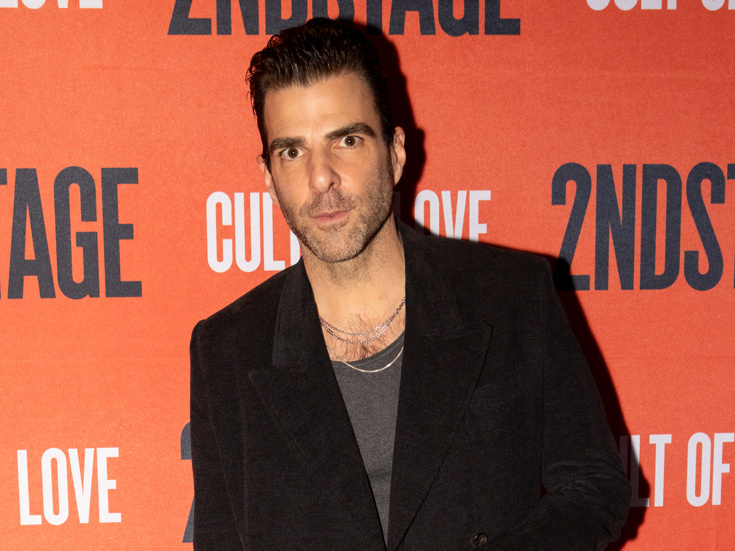
(Photo by Sergio Villarini for Broadway.com)
Zachary Quinto has played so many stoic, ultra-competent characters, it’s a jolt to see him embody a man riddled with emotional pain stemming from childhood in a deeply weird family. Leslye Headland’s Christmas-from-hell dramedy Cult of Love begins with Quinto strumming a jaunty carol on the banjo, harmonizing with parents, younger siblings and in-laws in a picture-perfect Connecticut farmhouse. When the music stops, the dysfunction kicks in, as multiple themes—religious fervor, addiction, homophobia, mental illness, dementia—are addressed or avoided by the starry 10-person cast.
In real life, it’s a busy season for Quinto as he juggles Cult of Love and the successful launch of NBC’s Brilliant Minds, in which he stars as a neurologist tackling impossible cases. Both projects feature formidable moms: Mare Winningham on Broadway and two-time Tony winner Donna Murphy on TV. Quinto recently chatted about his loyalty to the stage and how his personality differs from the many intimidating roles he has taken on.
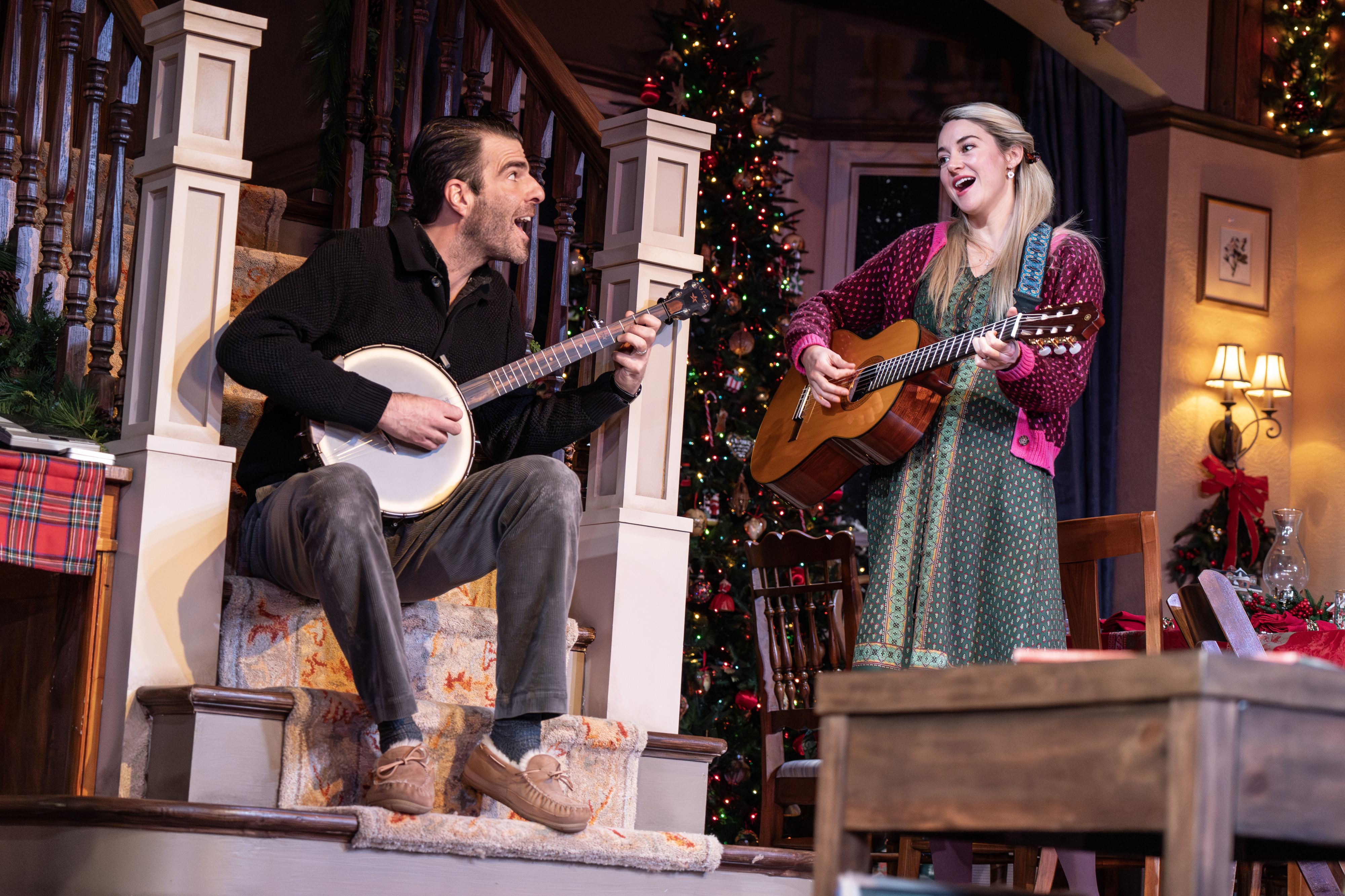
It's great to see you back on Broadway in such a juicy play. What made you say yes to Cult of Love?
Above anything else, the thing that drew me into the play was the humanity and the relatability of it. I understood who these people are to one another and how they’re struggling to find their place in the world. That authenticity is a testament to the talent of our playwright, Leslye Headland, as evidenced by how much is packed into 100 minutes. Fifteen or 20 years ago, this would have been a three-act play with two intermissions. She’s just an incisive observer of the human experience.
You’ve never been aimless or unsure about your career path in the way that your character, a divinity student-turned-lawyer, is. What drew you to him?
I’ve known what I wanted to pursue as a vocation for most of my adult life, but that doesn’t mean I haven’t been without my own doubts and uncertainties. My family is not nearly as dysfunctional as the Dahls, but it came close in certain ways. I think that’s true of everyone—the emotional and psychological and spiritual entanglements are universal. One thing I’ve loved about sharing the play with audiences is the variety of responses we’ve gotten. Most everyone has said that they’ve seen themselves or a member of their family on that stage. The question these characters, and therefore the audience, are confronted with is, “Is love enough?” And at the end of the play, I’m not sure everyone will have the same answer.
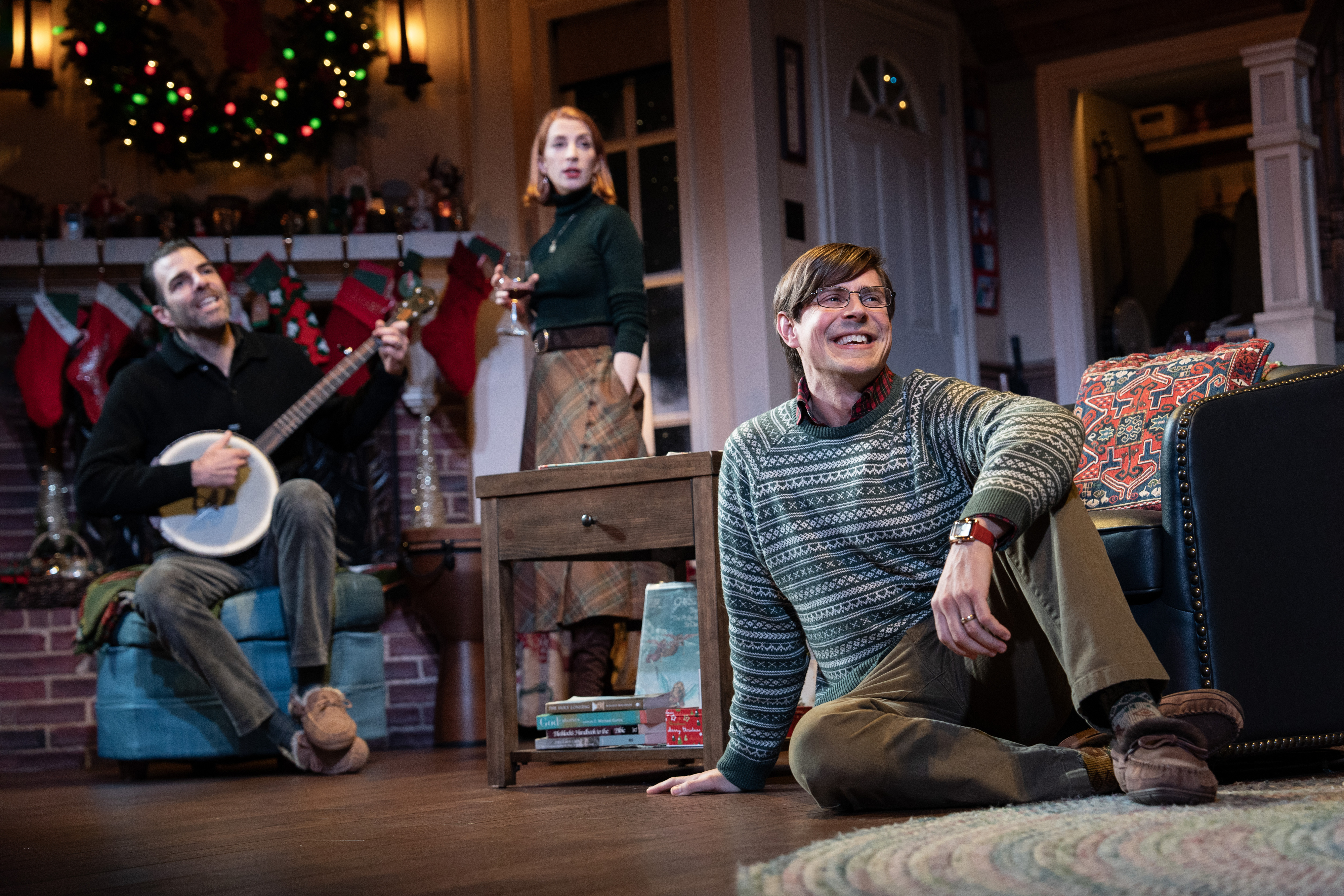
Meanwhile, the Dahl family sings harmony and plays a variety of instruments in several musical interludes.
The music has been an interesting and unique challenge. I’ve played the banjo for about 10 years, but I’ve never played and sung at the same time, and I’ve never played for an audience. That was daunting, but it’s ended up being incredibly fulfilling and inspiring.
You’re a leading man on screen, but you’ve done three ensemble plays [including Angels in America and The Boys in the Band] in New York. What appeals to you about being part of a large cast?
I love the tapestry that we get to weave together in this company. There are 10 people with very different personalities and processes, and we got really lucky. We only had three weeks of rehearsal before we started tech, so it was an immersive experience, one that reflects well on our director, Trip Cullman, and his capacity for supporting us and giving all of us what we needed to do our jobs. Together, we created an environment in which everybody felt heard and seen and empowered.
"When you invite the audience in, that’s when the play comes to life."
–Zachary Quinto
You could stay busy without ever acting on stage. What do you love about live theater?
I made a promise to myself in 2010 when I did Angels in America that I would try to do a play every other season. And for the most part, with the exception of the pandemic, I’ve been able to keep to that schedule. For me, the reciprocity and interaction with an audience is the joy; when you invite the audience in, that’s when the play comes to life. There’s nothing like that feeling of connection.
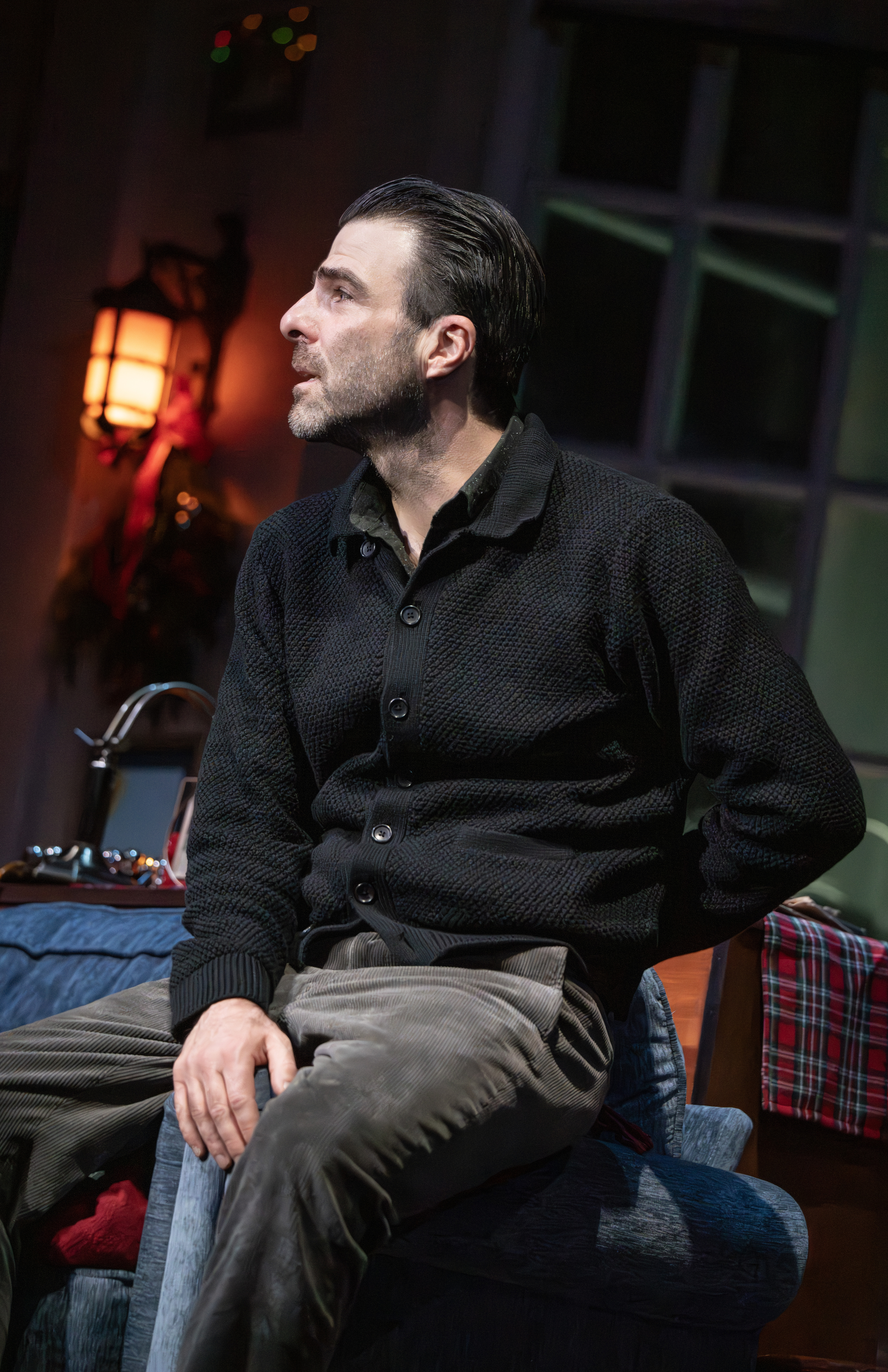
(Photo: Joan Marcus)
Two of your most intriguing recent plays have been produced in Los Angeles [Who’s Afraid of Virginia Woolf? ] and London [Best of Enemies, as Gore Vidal]. Any interest in doing them here?
Virginia Woolf, which I did it at the Geffen Playhouse in 2022 with Calista Flockhart, was an incredible experience. At the end of that run, I was just starting to understand the depth and complexity of the play and the character, so I would love to have an opportunity to play George again in New York. We thought Best of Enemies might come to New York, but the timing didn’t work out. I don’t know if there is a future for that, but it had been a longtime dream of mine to do a play in the West End.
Let’s talk about your new series Brilliant Minds. Any pilot that begins with André de Shields [as an Alzheimer’s patient] and ends with Donna Murphy [as the mother of Quinto’s character] is worth watching.
It’s a Broadway dream, isn’t it? [laughs] We film the show in Toronto, but it’s set in New York, so we were able to tap into the talent pool of Broadway actors. Mandy Patinkin makes an appearance on the show; Eden Espinosa is in an episode. I’ve loved Donna for a long time, and she brings so much skill and grace to her role. If we get a second season, we’ll keep tapping into the community of Broadway actors—at least the ones who aren’t tied up shooting The Gilded Age. Donna was going back and forth, doing double duty.
What pleases you most about playing Dr. Oliver Wolf?
I love the fact that it’s based on a real person, Oliver Sachs, the renowned neurologist and prolific author. I was drawn to his mind, and to the opportunity to tell stories about people struggling with life-altering challenges that many would consider insurmountable. Being part of a show that is amplifying a message of optimism and hope and inspiration is something I feel really grateful for. I’ve played a lot of dastardly characters in my career, so it’s exciting for me to play someone who is genuinely invested in the well-being of people and in finding ways to improve their lives.
"The question these characters, and therefore the audience, are confronted with is, 'Is love enough?'" –Zachary Quinto
Your character’s romance with a brain surgeon played by Teddy Sears is introduced with little fanfare, which is refreshing.
That’s right. It’s one aspect of who the character is, but it’s not the only defining characteristic of his life—and it’s one we address subtly and authentically. This is the first openly gay lead character on a prime-time network medical drama, and so for me, the honor and distinction of that is that it’s not a big deal. It’s an aspect that our showrunner, Michael Grassi, was interested in connecting with, and it feels great to be part of something that’s moving the needle a little bit in an appropriately complex way.
You’ve played a lot of intimidating guys, going all the way back to young Spock in three Star Trek movies. What’s the biggest misconception about you?
I think people would probably be surprised to know that I’m more lighthearted than some of the characters I’ve portrayed. I’m not as serious as people probably expect me to be. I appreciate the complexity of the characters I’ve played, and I recognize that I am a complex person in my own way, but I love to laugh. I love humor and heart in my work and in my life.
